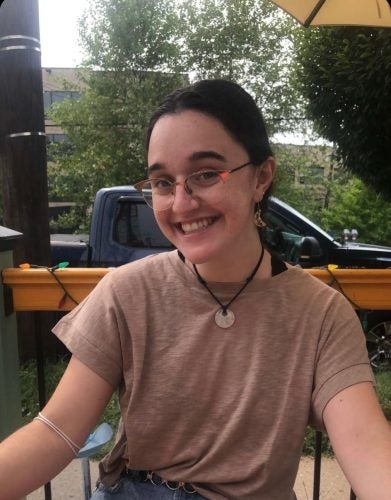By: Sarah Schechter, CELS Communications Fellow
“I’ve been really grateful to URI for encouraging students to step outside their comfort zone and push boundaries and see themselves as capable,” said senior Environmental Science and Management student, Emily MacDonald.
MacDonald had an unconventional college experience that started at American University in Washington, D.C. When the COVID-19 pandemic hit, she moved back home to Franklin, MA. Back in New England, she decided to transfer to URI, where she could commute to campus. The transition was difficult at first because the schools have different learning and social environments, but she found URI to be very welcoming and a perfect fit to finish her undergraduate career. “URI is very much a community and I feel very comfortable asking for help, and everyone is very friendly,” she elaborated.
As a commuter, MacDonald didn’t have the “college experience” of living on campus; that is, until this summer when she was selected as one of 10 undergraduate students for a National Science Foundation Research For Undergraduates (NSF REU) fellowship in South Dakota. “I was late to the round of applications, so I ended up just reaching out to somebody from the program and he encouraged me to apply. It was pretty easy and very communicative,” she shared.
She spent 10 weeks at South Dakota University networking with students and faculty, contributing to modern plant sciences research projects, and developing her presentation skills. MacDonald studied oat beta-glucan concentration and looked for loci that may contain genes coding for concentration. She was also able to work with other students and talk with them outside of the lab. “I’ve never been with a group of people who are very similar to me, education- and interest-wise, and it’s been beneficial because it’s gotten me talking about my research,” she mentioned. MacDonald spent the summer living in a dorm with other students, which gave her the “campus feel” she hadn’t yet experienced and helped her connect with like-minded people.
Returning to URI, she will resume work in Dr. Laura Meyerson’s lab, where she will spend the semester studying plant chemistry and analyzing how different levels of CO2, nitrogen, and salinity impact the plant’s volatile organic compounds (VOCs). VOCs are emitted as a response to a plant’s interactions with living and nonliving components of their environments. Dr. Meyerson has encouraged MacDonald throughout her time at URI, and MacDonald appreciates the professor’s commitment to her students. “Dr. Meyerson is the person who gave me a little bit of a push, and she’s just been a really wonderful resource for me,” she added.
This semester, along with her work in the lab, MacDonald’s classes include topics such as restoration ecology, watershed hydrology, forest science, and Geographic Information Systems (GIS). She is excited to use this semester to gain more insight into potential career paths and have more hands-on learning experiences in and out of the classroom. Looking to the future, MacDonald plans to use the skills she has gained through the fellowship and at URI to pursue a graduate degree or job that aligns with her passion for the environment, and she is grateful for the encouragement she has received from professors and peers along the way.

